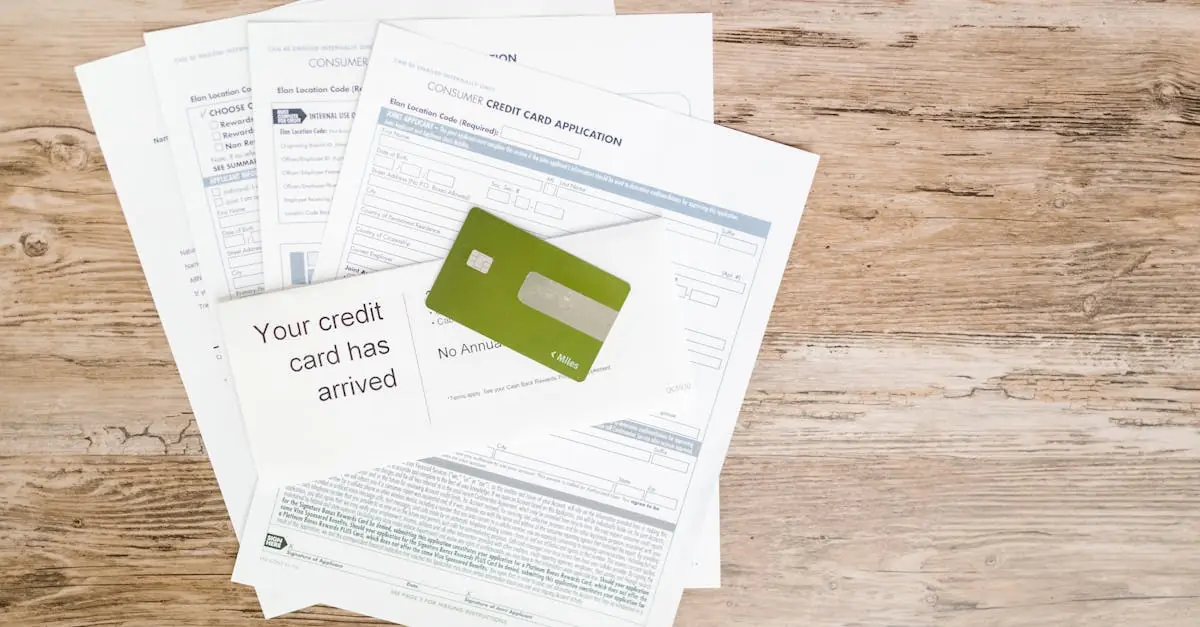Thinking about applying for a Discover card? It’s like wanting to join an exclusive club where the bouncers are your credit scores. But don’t worry; you don’t need a perfect score to get in. In fact, many folks are surprised to learn that a decent score can open the door to a world of rewards and benefits.
Table of Contents
ToggleUnderstanding Credit Scores
Credit scores play a crucial role in obtaining financial products like a Discover card. Knowing their significance helps applicants prepare for the card application.
What Is a Credit Score?
A credit score summarizes an individual’s creditworthiness. Ranges typically fall between 300 and 850, with higher scores indicating lower risk to lenders. FICO scores and VantageScore are the two primary scoring models used. Each model evaluates an applicant’s credit history and behavior, influencing approval decisions.
Factors Affecting Your Credit Score
Multiple factors influence credit scores, including payment history, credit utilization, and length of credit history. Payment history accounts for 35% of the score, reflecting the timeliness of past payments. Credit utilization represents 30% and measures the ratio of credit used to total credit available. The length of credit history contributes 15%, showing how long accounts have been active. New credit inquiries and types of credit each make up 10%, affecting the overall assessment. Understanding these factors aids in maintaining or improving credit scores.
Discover Card Overview
Discover offers a range of credit card options tailored to various needs and preferences. Applicants can choose cards that provide cashback rewards, travel perks, or build credit.
Types of Discover Cards
Discover provides several card types including the Discover it Cashback, Discover it Miles, and Discover it Student. Each card features unique rewards suited for diverse spending habits. The Cashback card offers 5% on rotating categories each quarter, while the Miles card focuses on travel rewards with no annual fee. Students benefit from cards designed for building credit history, which can help them establish a strong financial foundation.
Benefits of Discover Cards
Discover cards come with a variety of benefits that enhance user experience. Cashback rewards often apply to everyday purchases like gas, groceries, and dining. Customers enjoy no foreign transaction fees, making these cards ideal for international travel. Additionally, Discover offers a complimentary FICO score tracking feature, allowing cardholders to monitor their credit health. Enhanced customer service provides 24/7 assistance, ensuring support is available whenever needed.
Credit Score Requirements for Discover Cards
A good credit score plays a crucial role in applying for a Discover card. While a perfect score isn’t necessary, a strong credit history increases the chances of approval.
Minimum Credit Score Needed
Typically, a minimum credit score of 650 is recommended for Discover card applications. Applicants with scores above this threshold often secure better rewards and benefits. Discover may consider those with scores below 650; however, it’s easier to gain approval with higher scores. A score between 650 and 700 suggests decent creditworthiness, making applicants more appealing to Discover.
Impact of Other Factors on Approval
Credit scores aren’t the only determining factor for approval. Payment history carries significant weight, with timely payments demonstrating reliability. Credit utilization also matters, ideally staying below 30% of available limits to signal responsible borrowing. Length of credit history contributes to the approval decision; longer histories reflect established financial behavior. Income and debt levels additionally influence outcomes, providing insight into overall financial stability.
Improving Your Credit Score
Improving a credit score enhances the chances of approval for a Discover card. Several strategies can help applicants achieve their desired scores.
Tips for Boosting Your Credit Score
Establishing a consistent payment history influences credit scores significantly. Keeping credit utilization below 30% demonstrates responsible credit behavior. Monitoring credit reports regularly helps identify errors that may negatively impact scores. Reducing outstanding debts also contributes to a healthier financial profile. Avoiding unnecessary credit inquiries protects existing scores, maintaining a steady path toward improvement. Setting up automatic payments can ensure bills are paid on time, preventing late fees and penalties.
Resources for Credit Improvement
Utilizing financial education resources aids in understanding credit better. Many organizations offer free credit counseling services that provide tailored advice. Online tools, such as credit score simulators, allow users to experiment with different financial scenarios. Borrower-focused websites often feature articles and videos on credit management tactics. Joining online community forums helps connect individuals seeking similar advice and experiences. Local credit unions may also provide workshops and seminars on improving credit scores.
Understanding the credit score needed for a Discover card is essential for anyone looking to apply. While a score of 650 is recommended for better approval chances, many applicants with decent scores can still gain access to valuable rewards.
By focusing on improving credit scores through consistent payments and responsible credit usage, individuals can enhance their chances of approval. Discover offers a variety of card options tailored to different needs, making it an attractive choice for many.
With the right approach and knowledge, potential applicants can navigate the application process confidently and secure a card that fits their financial goals.



